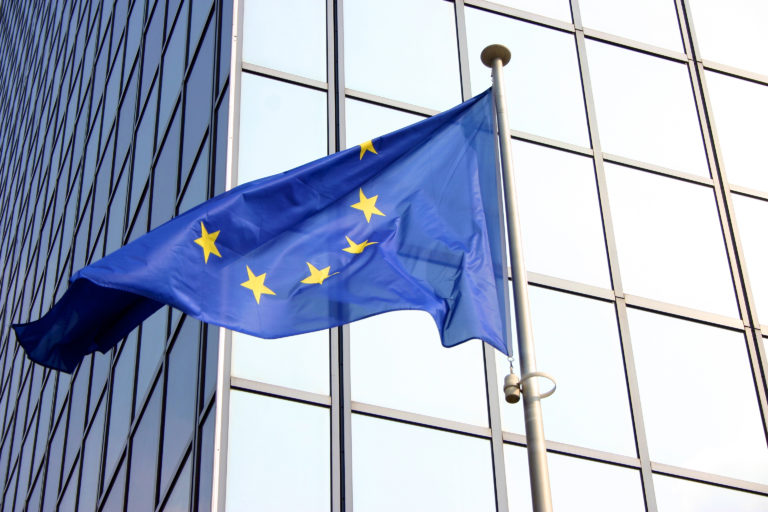Focus Topics
Our Expertise
We help our clients – customised and tailored to their needs. However, we do offer specific consulting concepts for a few selected focus areas.
With our consulting services in our focus topics, we respond to regulatory and macroeconomic changes in some of our target markets. With our offerings in ESG and sustainability reporting, climate strategy, circular economy, deforestation, and sustainable finance, we help our clients overcome today’s challenges and seize tomorrow’s opportunities.
Our Focus Topics in Detail
ESG Reporting
We support companies in developing and implementing structured, strategically embedded ESG and sustainability reporting – efficiently and tailored to the audience.
VSME, GRI, DNK, or ESRS: Various formats for ESG reporting are available for medium-sized companies – depending on their maturity level, objectives, and stakeholder requirements. With our reporting package, we jointly develop the right approach – from selecting the reporting standard to content design and integration into strategy and communications.

-
Our Services
-
Our Experience
Regulatory requirements for companies are evolving rapidly. Even though many medium-sized companies are unlikely to be directly affected by the reporting requirements of the CSRD (Corporate Sustainability Reporting Directive) based on current developments, expectations on the part of investors, customers, employees and partner companies are continuously rising. ESG transparency is increasingly becoming a prerequisite for resilient business relationships, successful financing processes and a strong market position.
With our reporting approach, we support companies in sustainability reporting – whether due to reporting obligations or on a voluntary basis. We use established frameworks, taking strategic objectives into account and with a clear focus on efficient implementation and impact.
Reporting Formats at a Glance
We provide support in selecting and applying appropriate reporting standards:
- CSRD / ESRS
Already mandatory for large companies. The European Sustainability Reporting Standards (ESRS) define specific disclosure requirements and serve as a reference framework for future developments. In the long term, this will become the European standard for reporting. - VSME
The voluntary EU standard for small and medium-sized enterprises. A lean, structured reporting option with high compatibility with the ESRS – ideal for companies that want to address the ESG requirements of their stakeholders. Due to its low complexity and practical application guidelines, the VSME is particularly well-suited for companies that want to publish sustainability information for the first time. - GRI (Global Reporting Initiative)
Internationally recognized and modular. Particularly suitable for companies with extensive stakeholder relationships or an international context. - DNK (Deutscher Nachhaltigkeitskodex – German Sustainability Code)
An established framework with clear criteria – suitable for getting started with ESG reporting and recognised in public tenders and in the financing environment.
Our approach
- Analysis and Selection
Based on a status quo assessment, we jointly determine which standard suits the objectives, industry, and company structure. - Materiality and Content
Through a materiality analysis, we prioritise relevant ESG topics along the value chain and stakeholder expectations. - Structure and Indicators
We develop a reporting logic, define suitable KPIs, and create the data basis for consistent reporting.
Your Added Value
Voluntary ESG or sustainability reporting is more than a formal exercise: it strengthens market position, supports access to financing, facilitates cooperation along the supply chain, and creates internal clarity about sustainability goals and potential. We develop strategies and processes to increase your ESG performance and make progress visible. We support you with a structured, standard-compliant, and resource-sensitive consulting approach – for effective ESG communication.
For many of our clients, we are already analysing the requirements and implications of ESG and sustainability reporting – both in the context of regulatory requirements and with regard to company-specific strategies, processes and reporting content.
One thing has become evident:
Whether in plastics processing, mechanical engineering, automotive, real estate, finance, agriculture, food retail or consumer goods – our approach to developing and implementing ESG reporting can be applied across all industries and has already been successfully implemented many times.
It is important to us that reporting not only meets formal requirements but also creates strategic added value. That is why we rely on a collaborative development process in which we combine our methodological expertise, our regulatory expertise, and our broad overview of current market requirements with our clients’ deep business understanding. This results in a reporting approach that is effective, compatible, and future-oriented.
Do you have questions about ESG reporting or need support? We look forward to hearing from you.
Climate Strategy
We support companies in developing a company-wide climate strategy – from GHG balance to a concrete transformation plan.
A robust climate strategy begins with the creation of a GHG balance (Corporate Carbon Footprint) and culminates in a concrete transformation plan with defined reduction targets, measures, and progress monitoring. Whether regulatory requirements, investor interests, or customer demands along the supply chain – a clearly formulated path to decarbonisation is increasingly becoming a central success factor. We help identify relevant emission sources, set targets, and develop pragmatic steps for emission reduction – strategically sound and compatible with existing sustainability processes.

-
Our Services
-
Our Experience
Building a sound climate strategy begins with the systematic collection and evaluation of greenhouse gas (GHG) emissions within the company. The basis for this is the creation of a Corporate Carbon Footprint (CCF). We adhere to the requirements of the GHG Protocol and ISO 14064. Together with the company, we define the organisational and operational boundaries and record all relevant emission sources – differentiated by the three emission scopes:
- Scope 1: Direct emissions (e.g., from vehicle fleet, plant operation)
- Scope 2: Indirect emissions from purchased energy
- Scope 3: Other indirect emissions along the value chain (e.g., upstream products, business travel, transport, product use)
We support in selecting suitable tools, define required activity data, assign appropriate emission factors, and perform the CCF calculation – transparent, auditable, and GHG-compliant. The evaluation of data quality and the creation of a standard-compliant GHG report form the basis for further strategic decisions.
The next step involves developing a long-term sustainable climate strategy:
- Development of a science-based long-term goal, e.g., Net Zero by 2045
- Definition of mid- and near-term targets, such as reduction targets by 2030 or 2035
- Identification of central decarbonisation levers along the relevant emission hotspots (e.g., energy supply, mobility, procurement, production)
Based on this, we create a transformation plan that specifies measures for reducing GHG emissions, prioritises them chronologically, and strategically embeds them into company processes. The plan enables consistent tracking of target achievement through integrated progress monitoring.
In connection with the CSRD, climate strategy has now also become relevant from a regulatory perspective. The ESRS E1 (Climate Change) reporting standard requires the disclosure of climate-related risks, GHG emissions, reduction targets, and measures. For reporting companies, developing a climate strategy is therefore not only sensible but necessary – especially to meet the requirements of the transformation plan according to ESRS E1 in a structured and effective manner.
Such a plan is also increasingly required outside the CSRD: investors, banks, business partners, and customers expect comprehensible emission data and concrete climate targets. Funding bodies and ESG rating agencies are also increasingly linking their assessments to credible decarbonisation strategies.
Our services are tailored to the specific needs of your company – scientifically sound, practice-oriented, and compatible with all common reporting standards and sustainability requirements.
In various projects, we have already supported the development of climate strategies – from the initial greenhouse gas balance to deriving effective measures and integrating them into an overarching sustainability strategy. We draw on extensive experience in creating Corporate and Product Carbon Footprints and also impart this know-how in practical training formats.
Our qualification in greenhouse gas accounting – certified by independent bodies – forms the foundation on which we work with our partners to develop sustainable solutions. We know the common tools and systems, understand what matters in their selection, and help maintain an overview in the growing market.
We also provide methodological and strategic support in developing science-based climate targets – in line with Science Based Targets. Because climate strategy only works if it is both ambitious and achievable.
Do you have questions about climate strategy or need support? We look forward to hearing from you.
Circular Economy
We support various companies in evaluating and implementing circular processes into their business models and value chains.
To operate sustainably within planetary boundaries in the long term, a rethinking of how we handle natural resources is needed. With the Circular Economy Action Plan, the EU has created the political framework conditions for the transformation to a circular economic system. We support companies in developing new strategies and business models that open up economic opportunities while meeting the regulatory and societal requirements for a circular economy.

-
Our Services
-
Our Experience
In the area of Circular Economy, we offer, among other things, the execution of status quo analyses, benchmark analyses, strategy development, training, and support in conceptualising circular business models and products.
Status Quo Analysis
As part of a comprehensive assessment, we first evaluate the key challenges of the respective industry and the upstream and downstream value chain in the area of Circular Economy. In the next step, we analyse our clients’ current performance regarding the integration of circular loops at both company and product level. In the form of a rating, we present the maturity of the current approach measured against current and future regulatory requirements and best practices observed in the market, and derive recommendations for action for a successive improvement of company processes.
Benchmarking
With our analysis concept, which can be adapted to individual customer needs, we compare our clients’ performance in the Circular Economy with the relevant peer group, taking into account topic-specific indicators. The benchmarking shows to what extent Circular Economy can be used as a USP in the respective industry and at the same time enables the identification of proven best practices that can serve as a basis for the further development of one’s own Circular Economy strategy.
Strategy development
As part of strategy development, we offer both the revision of existing Circular Economy strategies and a joint strategic repositioning. Based on specific impact and materiality analyses (in line with the requirements of the CSR Directive), we work with our clients to develop the central vision and mission, taking into account relevant stakeholder insights. The next step is the joint development of a holistic Circular Economy strategy at the company level, as well as sub-strategies for specific business areas or product segments.
In this process, we define ambitious, measurable goals for specific areas of the circular economy and derive concrete measures to achieve these goals.
Further Education
To holistically support the transformation to a circular economy, we offer tailor-made programs in the field of Circular Economy to impart knowledge on specific topics as well as methods and concepts of circularity. Our formats range from general concepts at the company level to in-depth sub-aspects of the circular economy in specific company processes and departments.
Business Model Development
The transition from a linear to a circular economic system requires innovation in many areas. Based on our proven business model workshop concept, we develop innovative business models in close cooperation with our clients that address central objectives of the Circular Economy.
We have successfully implemented our circular economy consulting concept in various client projects and can therefore guarantee a high degree of practicality and user-friendliness.
For example, we supported a plastics processing company in further developing its corporate strategy in the core area of circular economy and derived specific requirements, targets, KPIs and measures at both company and departmental level. In the automotive sector, we also developed zero waste targets and specific concepts and measures to achieve these objectives. We also work with non-profit organisations in the context of the circular economy. Among other things, we support the WWF in integrating circular aspects into various corporate partnerships.
What we are frequently asked about the circular economy
Do you have further questions about Circular Economy or need support with the transformation to a Circular Economy? We look forward to hearing from you.
Deforestation
We support companies and non-profit organisations in establishing deforestation- and conversion-free supply chains.
Regulations, such as the EU Regulation on deforestation-free supply chains, increasing demands from end customers, and the urgency of the climate and biodiversity crisis are increasing pressure on companies to design their supply chains free from deforestation and conversion. We support our clients in optimising their processes based on established frameworks such as that of the Accountability Framework Initiative (AFi), thus ensuring an ambitious handling of the deforestation issue by our clients.

-
Our Services
-
Our Experience
To develop and implement a strategy for deforestation-free supply chains, the requirements of the EU Regulation on deforestation-free supply chains must be integrated and stakeholders along the value chain must be involved. To cover due diligence, risk assessment, and measure definition for risk mitigation, it is necessary to establish comprehensive processes in supply chain management. We support companies from strategic positioning to practical implementation.
Status Quo Analysis
Our Status Quo Analysis not only serves to better understand current practices but also highlights the gaps on the path to a holistic management of deforestation and conversion issues.
Strategy development
Based on analysis results, various dimensions of supply chain management are considered, measures are identified and prioritised to develop an implementation plan for deforestation-free supply chains.
Implementation
When implementing strategies for deforestation-free supply chains, all dimensions of supply chain management are considered: from positioning one’s own company to communicating with and requesting information from suppliers within the mapping process.
Our Partner Network
To offer our clients the best possible support in implementing the EUDR, we collaborate with a selected network of experienced partners. These include:
- Technology providers who ensure technical implementation with powerful tools, including: LiveEO, osapiens (Gold Partner)
- Commercial Law Firms who provide legally sound information on regulatory requirements.
With complementary service portfolios and coordinated services, we enable tailored and practical solutions for our customers.
We work closely with companies, including those in food retail, food production, and paper manufacturing, to establish deforestation-free supply chains. As consultants, we also support a project group organized by WWF Germany, consisting of five companies, on their path towards deforestation- and conversion-free soy supply chains. To support the project group’s work, we first examined the central challenges in establishing deforestation- and conversion-free value chains in a comprehensive study and analyzed solutions to overcome existing barriers.
What we are frequently asked about the deforestation
Do you have further questions about deforestation or need support with implementing the EUDR in your company? We look forward to hearing from you.
Sustainable Finance
Financial institutions can count on us as a partner that provides comprehensive support. Our range of services extends from optimising proprietary investments and product strategy to operational ecological issues.
Sustainable Finance has gained significant momentum, especially since the adoption of the Paris Climate Agreement. Regulatory pressure on financial market participants has been steadily increasing ever since. In addition to financing a sustainable transformation of the economy, the main themes are the adaptation of opportunity and risk management, as both climate change and the transformation can have a material impact on the business models of investees and borrowers. Added to this is a growing interest in sustainability in society, which is driving demand for sustainable investments.

-
Our Services
-
Our Experience
Our Sustainable Finance expertise includes both aligning capital with sustainability goals and optimising operational ecological processes. Further consulting focuses also lie in product development, optimising marketing and sales activities, and employee training.
Investment Strategy:
Together with our clients, we assess the sustainability performance of their investment portfolios and identify key sustainability challenges. Subsequently, we develop objectives for the sustainable development of the portfolio – these can include, for example, Science Based Targets in the climate context, but also biodiversity or social objectives. To achieve these goals, we support our clients in developing adapted investment approaches, because the design of the investment strategy is crucial for creating real sustainability added value. Therefore, we also cover the complete spectrum of strategies, from exclusions, ESG integration, and best-in-class approaches to engagement strategies.
Operational Ecology:
Typically, well over 90% of financial institutions’ sustainability impacts lie outside their own corporate boundaries in their investment or loan portfolios. Nevertheless, we believe that a credible and serious strategy for optimising their own impacts is part of a holistic sustainability strategy. We therefore offer our clients a comprehensive portfolio of services – whether it involves developing Paris-compatible climate targets for their own emissions, drawing up procurement guidelines, mobility concepts or travel expense guidelines.
Product Development:
Regardless of whether it’s lending or investment business – with Nextra, our clients have a partner by their side who supports them from initial conceptualisation to marketing. We keep an eye on regulatory requirements for sustainable products during product conceptualisation and help you master the balancing act between an ambitious sustainable investment or lending strategy and a sustainability narrative that is understandable to clients.
Marketing and Sales:
Successful marketing of sustainable products requires understanding customer expectations and needs as precisely as possible to then establish tailored customer engagement, consulting, and communication. Therefore, we conduct customer journey analyses and mystery shopping for our clients with a focus on sustainability. In this way, we capture the current status quo of sales performance and simultaneously derive optimisation potential for various customer touchpoints along the customer journey. We pursue a multi-channel perspective here, which includes online and print communication in addition to personal conversations.
Training:
Often, the first step is to create awareness for the necessity of change and then to build topic-specific knowledge tailored to the needs of different target groups within the company. Therefore, we offer basic training on sustainability as well as on Sustainable Finance, and on the other hand, we create training programs tailored to the individual needs of the audience for our clients.
We have been working trustfully with many of our clients in the Sustainable Finance sector for many years. Our client base is quite diverse, ranging from corporations like Union Investment and KfW to small and medium-sized financial institutions from the Sparkassen and Volks- und Raiffeisen networks, as well as non-profit organisations like WWF and Greenpeace. In recent years, we have implemented Sustainable Finance projects in Germany, Great Britain, France, Sweden, Luxembourg, and Switzerland, among other places. Nextra is also involved in research and teaching. For example, we took on teaching assignments at the Frankfurt School of Finance and Management and are a founding member of the Sustainable Finance Research Group.
What we are frequently asked about Sustainable Finance
Do you have further questions about Sustainable Finance? We look forward to hearing from you.